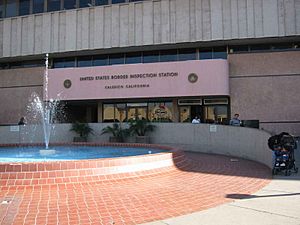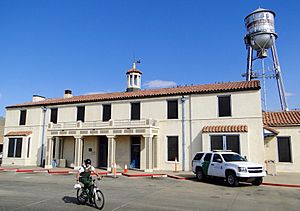Calexico West Port of Entry facts for kids
Quick facts for kids Calexico West Port of Entry |
|
|---|---|

Calexico West Border Inspection Station
|
|
| Location | |
| Country | United States |
| Location | 200 East First Street, Calexico, California 92231 |
| Coordinates | 32°39′54″N 115°29′47″W / 32.665106°N 115.496349°W |
| Details | |
| Opened | 1902 |
| Phone | (760) 768-2626 |
| Hours | Open 24 Hours |
| Exit Port | Mexicali, BC, Mexico |
| Statistics | |
| 2011 Cars | 7,099,725 |
| 2011 Trucks | 0 |
| Pedestrians | 4,451,119 |
|
US Inspection Station-Calexico
|
|
| NRHP reference No. | 91001749 |
| Added to NRHP | February 14, 1992 |
The Calexico West Port of Entry is a very important place where people and goods cross the border between the United States and Mexico. It's in Calexico, California, right next to Mexicali, Mexico. Think of it as a busy doorway between two countries!
This crossing helps travelers get to major roads. You can easily reach Interstate 8 in the U.S. from here. In Mexico, Mexican Federal Highway 5 starts its journey south. The crossing is currently being updated to make it even better for everyone.
History of the Crossing
People have been crossing the border at Calexico for a long time. It started in the late 1800s. The area grew a lot when the dry Imperial Valley became rich farmland. This happened because of irrigation, which is a way to bring water to dry land.
In 1906, the Colorado River flooded badly. This flood helped create the fertile land. A man named George Chaffey helped solve the flood problem. He also planned out towns like Calexico and Mexicali. Because of his work, the area was named the Imperial Valley.
The first official border inspection station was built in 1933. It is on Heffernan Avenue. This old building is now a historic site. It is listed on the National Register of Historic Places. Today, it is still used as government offices.
In 1974, a newer and bigger crossing was built. It is located just two blocks west of the old station. This new crossing is also near the international train tracks.


